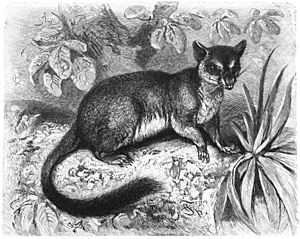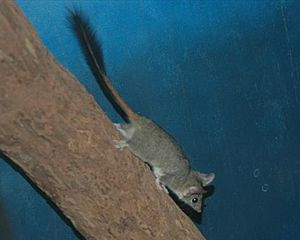Phascogale facts for kids
Quick facts for kids Phascogale |
|
|---|---|
 |
|
| Brush-tailed phascogale (Phascogale tapoatafa) | |
| Scientific classification |
|
| Kingdom: | Animalia |
| Phylum: | Chordata |
| Class: | Mammalia |
| Infraclass: | Marsupialia |
| Order: | Dasyuromorphia |
| Family: | Dasyuridae |
| Subfamily: | Dasyurinae |
| Tribe: | Phascogalini |
| Genus: | Phascogale Temminck, 1824 |
| Type species | |
| Didelphis penicillata Shaw, 1800
( = Vivera tapoatafa, F. Meyer, 1793 |
|
| Species | |
|
See text |
|
The phascogales are small, meat-eating marsupials from Australia. They are also known as wambengers or mousesacks. These animals belong to a group called Dasyuridae, which includes other marsupials like quolls and Tasmanian devils.
There are three types of phascogales: the brush-tailed phascogale, the red-tailed phascogale, and the northern brush-tailed phascogale. The name Phascogale was created in 1824 by Coenraad Jacob Temminck. It means "pouched weasel," which describes these animals well. Sadly, all three species are currently listed as either Near Threatened or Vulnerable by the IUCN. This means they need our help to survive.
Types of Phascogales
The phascogale family includes these three species:
- Brush-tailed phascogale – Phascogale tapoatafa
- Red-tailed phascogale – Phascogale calura
- Northern brush-tailed phascogale – Phascogale pirata
Life Cycle and Reproduction
Phascogales usually mate between May and July. After mating, the male phascogales complete their life cycle. Female phascogales give birth to about six babies around 30 days later.
Unlike many other marsupials, phascogales do not have a permanent pouch. Instead, the mothers form temporary folds of skin around their milk glands when they are pregnant. This area is sometimes called a "pseudo-pouch." The young stay in this pseudo-pouch area and drink milk for about seven weeks. After this, they move to a nest. They stay in the nest until they are about 20 weeks old and are ready to be on their own. Female phascogales usually live for about three years and have one group of babies in their lifetime.
Images for kids
See also
 In Spanish: Tafas para niños
In Spanish: Tafas para niños
 | Kyle Baker |
 | Joseph Yoakum |
 | Laura Wheeler Waring |
 | Henry Ossawa Tanner |






